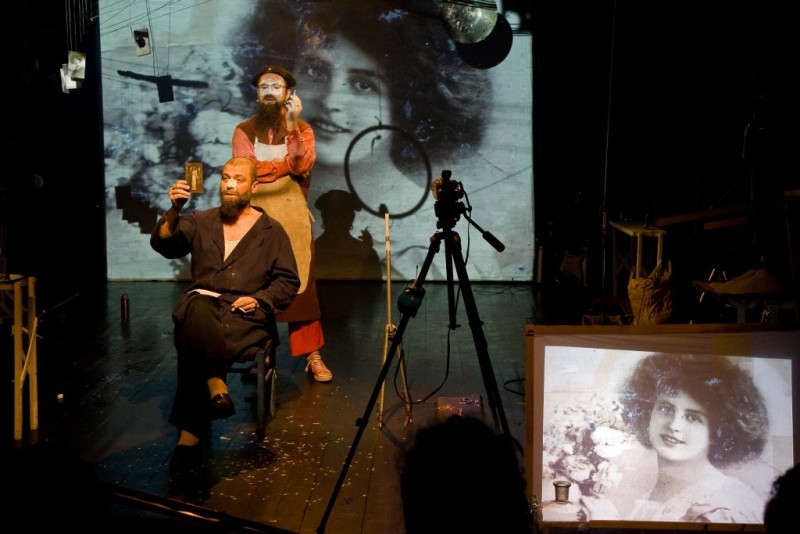 A number of complex creations of metal, wood, wire, and paper litter the dimly lit stage; an electric guitar is strummed by a plectrum wired to a glass bowl swinging on the end of a long string; various tables, a fish tank, screens, pulleys, trolleys, and ropes lie inert, like the abandoned, half-realised experiments of a mad Heath Robinson fixated scientist. Could that be the body of the scientist lying on the floor at the back of the stage?
A number of complex creations of metal, wood, wire, and paper litter the dimly lit stage; an electric guitar is strummed by a plectrum wired to a glass bowl swinging on the end of a long string; various tables, a fish tank, screens, pulleys, trolleys, and ropes lie inert, like the abandoned, half-realised experiments of a mad Heath Robinson fixated scientist. Could that be the body of the scientist lying on the floor at the back of the stage?
At the signal of smoke and green lasers refracted through glass bowls and bounced from the back of spoons, an hour of manic visual and sonic invention ensues. Books catch fire, and are whipped into submission, toys are led to suicidal leaps from table tops, politicians blurt their rhetoric into full fish tanks of water, and the faded tokens of unrequited love are hung out on the line to dry.
Previous Total Theatre Award and Fringe First winners, St Petersburg’s Akhe make their second appearance at the Manipulate Festival with their self styled brand of ‘Optical, or Russian Engineering theatre’. It is challenging to articulate exactly what this genre comprises, but the earlier allusion to scientific experiment seems entirely relevant. In these seventeen vignettes the eponymous – though emphatically non-existent – Gobo has his soul picked apart by scientific and philosophical proposition, sculptural kinetic assemblages, and an empirically rigorous attention to craft and detail.
What prevents this from descending into a Pythonesque assemblage of surrealist skits, burping with colour and noise, is both the underlying sense that there is, in fact, a singular dramatic intent grumbling, groaning, and creaking underneath it all, and the echoes of Beckett’s appreciation of the thin, barely discernible divide between the tragic, the comic, and the absurd (I am assured, however, that Gobo and Godot are unrelated)
Akhe’s founders and two most long-standing members Maxim Isaev and Pavel Semchenko approach the various scenarios and their attendant constructions with a deft, light touch – never so manic as to slacken the narrative line into chaotic flapping, but not so precious as to exclude fun from the complex machinations they are working with. A thrillingly effective sound design from Andrey Sizintsev and Denis Kritsov – part sampled Russian folk, part dark, industrial ambient – helps to effectively snap the atmospheric changes from one scene to the next. (And one should also congratulate the Traverse for their in-house sound system which has impressed forcefully throughout this year’s Manipulate Festival.)
The third performer is technology itself. The multiple screens, mobile devices, and GoPro cameras play an active part in proceedings, presenting audiences with the relatively new challenge of deciding where exactly to place its focus: on the performers, on the screen, on the characters momentarily performed by wind-up toys?
This is the new technology theatre – reimagining space, reconfiguring time, and pulling focus through refracted lenses, glass, and mirrors. The emotional impact is often stirred by a balanced interplay between live performance, projected image, animated props, hi tech media capture tools, and audiovisual mash ups of all of the above. A knife approaches the pocket-sized black and white photograph of a failed love. We can see the photograph on the floor. We can see the hand holding the knife. Looking up, however, we can see on screens the creases on the tiny image, the glint of light on the very edge of the blade. A burning book hovers over the collapsed figure holding the knife. The blade draws perilously close to the painful memory. There is a thin, tight cord between the edge of the blade and the belly of the figure portrayed in the image. At the instant of committing to the blow the image recoils as the camera – cut free from its mooring –launches high into the air, and begins a slow metronomic rocking to and fro across the full breadth of the stage. It is a devastatingly effective emotional punch, absolutely theatrical, and impossible to conceive of with out this new palette of small, affordable high tech tools.
Akhe are piloting a singular course in visual theatre: one with broken borders and lost divisions between craft disciplines and expressive genres. It is a compelling journey, and we should be clamouring to demand their return to the UK as soon as possible.
